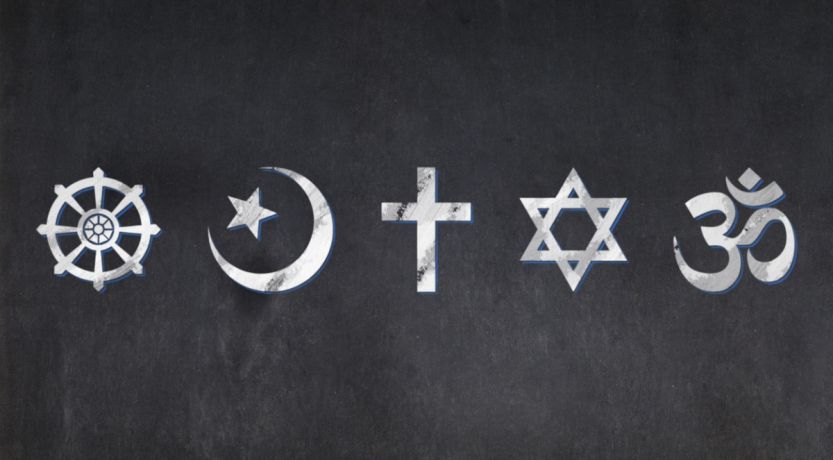Are there many paths to salvation? Do all religions lead to the same God? Does it matter which church you attend? What does the Bible say about the way God wants us to live?

Christianity is more than a belief—it is a way of life. In the early years of the New Testament Church, before they came to be called Christians, the followers of Jesus Christ were known as those who followed “the Way” (Acts 9:2; 19:9, 23).
Jesus even said His way of life has a narrow gate and is a difficult way, “and there are few who find it” (Matthew 7:14).
Yet many religious people today teach that there are many paths to heaven. Some believe all religions lead to the same God. Many believe it doesn’t matter which church you attend.
My earliest recollection of the teaching of “many roads”
It was a particularly warm Sunday morning. Air conditioning in rural areas was a rarity in the early 1950s. A small group of families sitting on the wooden benches in the country church focused on their pastor as he lifted his worn Bible and stated, “There are many roads to the top of the mountain.”
He told us that all Christians, all churches, in spite of having some difference in their doctrines, will reach the same goal (in his mind that was heaven). Others are just taking a different road. All will arrive eventually at the same place.
My parents were members of one of the two Protestant congregations in our small farming community. Those two churches faced each other across an unpaved country road. About half of the people attended where my parents did, and the other half attended a different denomination across the road. Some of their beliefs were similar, while others were quite different.
Were the members of both congregations headed for the same destination? It is important to note first of all that the Bible teaches we are not immortal and thus do not go to heaven or hell when we die (see “Do Humans Have an Immortal Soul?”).
But the question still remains. On the broader scale, are all churches—all religions—leading to the same God? What does the Bible say?
Jesus Christ and the religions of His time
When Jesus came to this earth and began His ministry, He did not join the established religions of that time. The leaders of those groups soon turned hostile, viewing Him as both a competitor and a heretic. His followers and the Church that He built came to be viewed as a sect or cult (Acts 24:14). This view has continued down through the centuries even to our time.
Jesus told His followers that many who were religious and regularly attended religious services would be shocked to learn they had taken the wrong road.
“Not everyone who says to me, ‘Lord, Lord,’ will enter the kingdom of heaven, but the one who does the will of my Father who is in heaven. On that day many will say to me, ‘Lord, Lord, did we not prophesy in your name, and cast out demons in your name, and do many mighty works in your name?’ And then will I declare to them, ‘I never knew you; depart from me, you workers of lawlessness’” (Matthew 7:21-23, English Standard Version).
When asked what would be a sign of the end of this age and His return, Jesus warned that many would use His name to give legitimacy to their teachings and so would deceive many. He said not to go with them.
“Take heed that you not be deceived. For many will come in My name, saying, ‘I am He,’ and, ‘The time has drawn near.’ Therefore do not go after them” (Luke 21:8).
It is extremely important to prove all things and to hold fast to what is good and acceptable to God (1 Thessalonians 5:21).
Paul and others taught just one way
Many denominations exist today. They represent a multitude of differing beliefs about the role of God’s Spirit, whether it is important to be baptized and, if so, in what way. To baptize, some sprinkle a little water, while others pour, and still others believe a person should be totally immersed.
These are just a few of the many variations in their teachings. Does it matter what one believes and practices?
The writers of the New Testament did not teach there were different paths to eternal life in the Kingdom of God. They emphasized that there was only one way to salvation.
The writers of the New Testament did not teach there were different paths to eternal life in the Kingdom of God. They emphasized that there was only one way to salvation.
Paul wrote, “There is one body and one Spirit, just as you were called in one hope of your calling; one Lord, one faith, one baptism; one God and Father of all, who is above all, and through all, and in you all” (Ephesians 4:4-6).
Paul reproved the Corinthians for giving audience to some ministers who used Jesus’ name but had not been sent by Him. Just because they preached about Him did not mean their message was consistent with the truth He taught.
“But I am afraid that your minds will be led away from your true and pure following of Christ. This could happen just as Eve was tricked by that snake with his clever lies. You seem to be quite patient with anyone who comes to you and tells you about a Jesus that is different from the Jesus we told you about. You seem very willing to accept a spirit or a message that is different from the Spirit and message that you received from us” (2 Corinthians 11:3-4, Easy-to-Read Version).
The Bible is clear that the worship of other gods is not the same as the worship of the true God. It is not calling on the same God using a different name. It breaks the First Commandment!
Peter stated about Jesus’ name, “Nor is there salvation in any other, for there is no other name under heaven given among men by which we must be saved” (Acts 4:12). That has never changed! “Jesus Christ is the same yesterday, today, and forever” (Hebrews 13:8).
God’s way: what does He want us to do?
When a young man asked Jesus what he must do to have eternal life, Jesus answered, “But if you want to enter into life, keep the commandments” (Matthew 19:17).
The Bible shows that the first step is to repent, to stop breaking God’s commandments, to feel remorse for having done so, and to change one’s life. To turn to obedience to the law that God wrote with His finger on the two tablets of stone is just another way of saying to repent, to turn from a life of lawlessness. (See more in our articles “The 10 Commandments for Today” and “How to Repent.”)
This step must be accompanied by the understanding that God sent His Son to pay the penalty for our sins by giving His life for us and that in and through His name we can be forgiven. “To Him all the prophets witness that, through His name, whoever believes in Him will receive remission of sins” (Acts 10:43).
Following our acceptance of Jesus Christ as our Savior and turning our lives around to be in harmony with the laws of God, we finalize our commitment by baptism (Acts 2:37-38). God then gives us the gift of His Holy Spirit.
No one can enter into eternal life without the gift of the life-giving Spirit of God (Romans 8:9, 11, 14). That indwelling Spirit of God imparts to us the gift of eternal life as well as the power we need to serve Him in spirit and in truth.
We were born into this world as physical human beings with a limited life span. We were created mortal, subject to death. Unless we receive immortality through the gift of God’s Spirit, we will cease to exist.
There is no other way!
There is only one way for anyone to receive eternal life. That is through repentance, baptism in the name of Jesus Christ, and receiving the gift of God’s Spirit. There are no shortcuts, no other roads or paths that lead to His Kingdom.
When Jesus said He would build His Church (Matthew 16:18), He also firmly stated that it would never die out. So somewhere is His Church, and since He is the Head of His Church (Colossians 1:18), He wants us to be part of it now.
Jesus said that anyone who attempts to come in any other way is a thief and a robber (John 10:1).
Finding the one way
It behooves each of us to examine our beliefs from the teachings of the Bible. The Bible is the only true source of knowledge. It is the only real road map to eternal life in the Kingdom of God.
Study more about the one way of God in our article “Narrow Is the Gate: What Did Jesus Mean?” and our booklet Where Is the Church Jesus Built?





